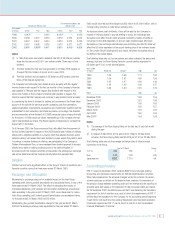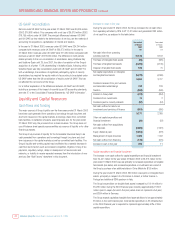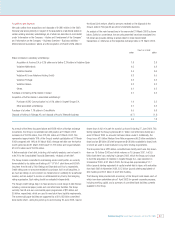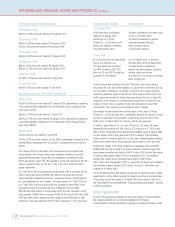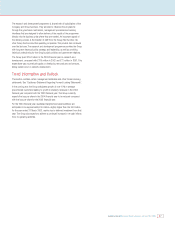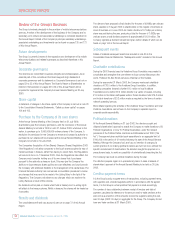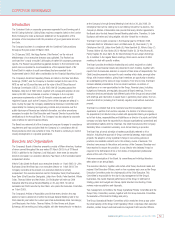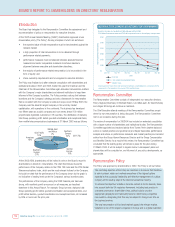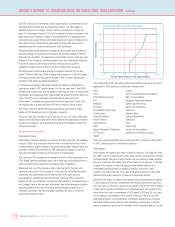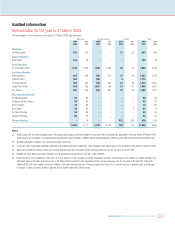Vodafone 2003 Annual Report Download - page 53
Download and view the complete annual report
Please find page 53 of the 2003 Vodafone annual report below. You can navigate through the pages in the report by either clicking on the pages listed below, or by using the keyword search tool below to find specific information within the annual report.
Vodafone Group Plc Annual Report & Accounts and Form 20-F 2003 51
Research and development
The Group continues to pursue an active research and development programme
for the enhancement of mobile telecommunications. Full details as to the Group’s
research and development programme and activities can be found under
“Operating and Financial Review and Prospects – Research and Development,
Patents and Licences, etc.”elsewhere in this Annual Report.
Directors’ interests in the shares of the Company
The Board’s Report to Shareholders on Directors’ Remuneration on pages 56 to
66 details the directors’ interests in the shares of the Company.
Directors’ interests in contracts
None of the current directors had a material interest in any contract of
significance to which the Company or any of its subsidiary undertakings was a
party during the financial year.
Employee involvement
The Board’s aim is that employees understand the Company’s strategy and are
committed to the Vodafone Vision and Values.
The Group’s vision is to be the world’s mobile communications leader –
enriching customers’ lives, helping individuals, businesses and communities be
more connected in a mobile world.
Its values are:
•Passion for customers. Our customers have chosen to trust us. In return, we
must strive to anticipate and understand their needs and delight them with our
service.
•Passion for our people. Outstanding people working together make Vodafone
exceptionally successful.
•Passion for results. We are action-oriented and driven by a desire to be the
best.
• Passion for the world around us. We will help the people of the world to have
fuller lives – both through the services we provide and through the impact we
have on the world around us.
Together, the Vision and Values provide a common understanding of where the
Group is going and a common way of doing things. The Company is determined
that they will flourish across every operating company, challenging everyone to
understand them, own them and contribute to their delivery and a range of
initiatives have been introduced to ensure this.
During the year, the Chief Executive, Sir Christopher Gent, and Group Chief
Operating Officer, Julian Horn-Smith, have hosted a series of “Your Call”
sessions. These are designed to demonstrate how the Vodafone Values are being
applied across the business and give employees the opportunity to talk to Sir
Christopher and Julian about the ways in which the Vision and Values have made
a difference to their working lives. At 31 March 2003, “Your Call”had visited
Australia, New Zealand, the United States, Germany, Italy, Spain, the UK and
Portugal, with further visits planned to other countries.
The Board places a high priority on effective employee communications to
promote the Values and other important messages and a wide range of
mechanisms is used to achieve this. These include management presentations,
in-house publications, team briefings, e-mail, intranet sites, employee focus
groups and conferences.
The Group is implementing a global team briefing process for effectively sharing
information with all employees on key performance indicators for the business
and progress towards achieving our strategic objectives. Within our European
subsidiaries, employee representatives meet annually in a consultative forum
with representatives of the central management team to discuss the progress of
the Group and transnational issues.
The effectiveness of the Group’s communications policies and the Group’s
standing as an employer is measured via Group wide surveys of employees
conducted at regular intervals.
Employee education, training and development
Learning and development continue to be important elements in ensuring the
future success of the Group. Policies to assist employees in reaching their full
potential and a wide variety of learning opportunities are in place. This has been
reinforced by the establishment of the Vodafone Global Campus, (a virtual
corporate university) designed to align training and development to the business
needs of the Group, to provide a global learning management system and to
share training resources and best practices around the world.
Programmes of business-related further education and management
development are sponsored by the Group. Over 50 ‘early in their careers’
managers are now in the Global Leadership programme, studying for a Masters
of Business Administration, or MBA, and, for some of the five-year programme,
working in other countries and functions as part of their development. Other
programmes are provided to help employees meet the training requirements of
their chosen professional institution, thereby continuing to raise the level of
professionalism in the Group.
Employment policies
The Group’s employment policies are consistent with the principles of the United
Nations Universal Declaration of Human Rights and the International Labour
Organisation Core Conventions and are developed to reflect local legal, cultural
and employment requirements. High standards are maintained wherever the
Group operates as we aim to ensure that the Group is recognised as an
employer of choice. Employees at all levels and in all companies are encouraged
to make the greatest possible contribution to the Group’s success.
The Group considers its relations with its employees to be good.
Equal opportunities
The Group operates an equal opportunities policy for all aspects of employment
regardless of race, nationality, sex, marital status, disability or religious or political
belief. In practice this means that the Group will select the best people available
for positions on the basis of merit and capability, making the most effective use
of the talents and experience of people in the business, providing them with the
opportunity to develop and realise their potential.
The disabled
The directors are conscious of the special difficulties experienced by the
disabled. In addition to giving disabled people full and fair consideration for all
vacancies for which they offer themselves as suitable candidates, efforts are
made to meet their special needs, particularly in relation to access and mobility.
Where possible, modifications to workplaces have been made to provide access
and, therefore, job opportunities for the disabled. Every effort is made to continue
the employment of people who become disabled, not only by the provision of
additional facilities but also training where appropriate.


